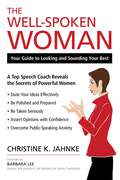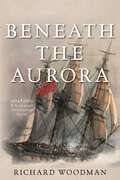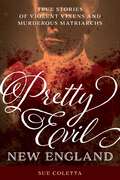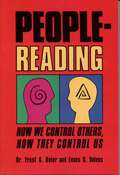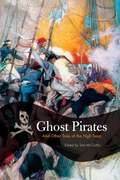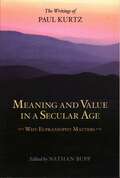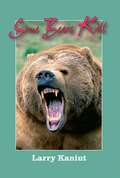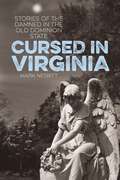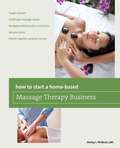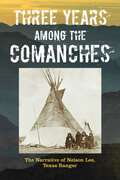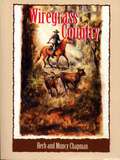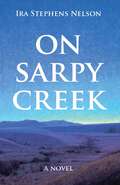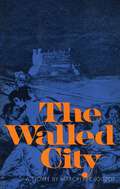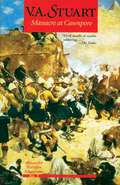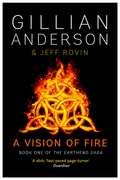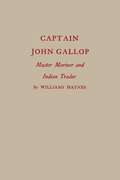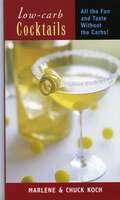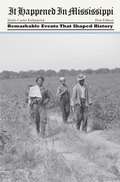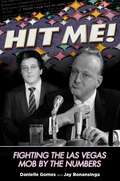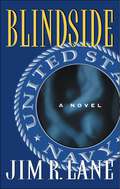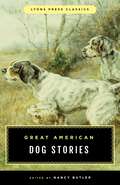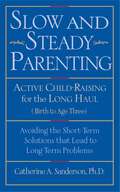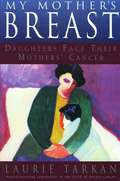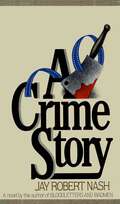- Table View
- List View
Well-Spoken Woman: Your Guide to Looking and Sounding Your Best
by Christine K. JahnkeSheryl Sandberg advises women to "lean in" to realize their full potential. To do so successfully, women need effective communication skills and a confident presentation style.In this must-have guide, one of the nation's premier speech coaches shares tested techniques from twenty years of coaching women on what works and what doesn't. The author details the practices and techniques of successful women to help all women improve their presentation and public speaking skills. With access to her expertise, you'll learn strategies that will help you present your best self in forums from PTA meetings to TV studios, conferences to classrooms, boardrooms to YouTube. The author has advised First Lady Michelle Obama for her International Olympic Committee speech, provided speaker training to Hillary Clinton's presidential campaign, and coached corporate CEOs and more women elected officials than any other trainer. Every woman can benefit from studying the polished speaking skills of such powerful women. Strategic advice on everything from messaging to hair and hemlines will allow you to come across as polished and prepared. The author includes easy-to-follow exercises so you can try out techniques immediately, from the use of sound bites and secrets to establishing eye contact to what not to do with your hands.Filled with behind-the-scenes advice, this book is for every woman who wants to present herself well, express her ideas with confidence, and earn the respect of any audience.
Beneath the Aurora: A Nathaniel Drinkwater Novel (Nathaniel Drinkwater Novels)
by Richard WoodmanThe year is 1813. Captain Nathaniel Drinkwater succeeds Lord Dungarth as head of the Royal Navy&’s Secret Department. While the Grand Army of Napoleon faces defeat on the battlefields of Germany, the discovery of a secret treaty with America leads Drinkwater into the forbidding fjords of Norway, and one of the most desperate missions of his career. Increasingly isolated and affected by the long war with France and her allies, Drinkwater pursues his personal odyssey against often daunting odds. In a compelling narrative, the author brings vividly to life conditions at sea during the Napoleonic Wars. The fate of one of Napoleon&’s most charismatic marshals is linked with American privateers, escaped prisoners, and the Danish Navy, resulting in a violent confrontation set beneath the aurora.
Pretty Evil New England: True Stories of Violent Vixens and Murderous Matriarchs
by Sue ColettaFor four centuries, New England has been a cradle of crime and murder—from the Salem witch trials to the modern-day mafia. Nineteenth century New England was the hunting ground of five female serial killers: Jane Toppan, Lydia Sherman, Nellie Webb, Harriet E. Nason, and Sarah Jane Robinson. Female killers are often portrayed as caricatures: Black Widows, Angels of Death, or Femme Fatales. But the real stories of these women are much more complex. In Pretty Evil New England, true crime author Sue Coletta tells the story of these five women, from broken childhoods, to first brushes with death, and she examines the overwhelming urges that propelled these women to take the lives of a combined total of more than one-hundred innocent victims. The murders, investigations, trials, and ultimate verdicts will stun and surprise readers as they live vicariously through the killers and the would-be victims that lived to tell their stories.
People Reading: Control Others
by BeierEvery time we talk with people we are trying to influence their behavior, and they are trying to influence ours. The words we use, the way we dress and move, are all ways to seek to control one another. Though we may make these attempts unknowingly, they leave us open to dangerous manipulation. People-Reading will teach you how to listen and what to look for in yourself and those around you, so you can identify underlying hidden motives, expectations, and fears. By reading these hidden messages you can avoid their damaging effects.
Ghost Pirates: And Other Tales Of The High Seas
Ghosts. Pirates. Put the two together and you&’ve got a winning combination of the most exciting stories ever written. It's enough to make anyone say, "Shiver me timbers"--with delight.The spirits of Davy Jones's locker have a long and colorful history among sailors and lovers of literature. From Daniel Defoe's "The Four Years Voyages of Capt. George Roberts" to Thomas Smollet's "The Adventures of Peregrine Pickle" to Washington Irving's "Adventures of the Black Fisherman," ghost pirates swashbuckle in and out of the scene, stealing the souls of the doomed and frightening the innocent. Prepare yourself for a thrilling ride.
Meaning and Value in a Secular Age: Why Eupraxsophy Matters - The Writings of Paul Kurtz
by Paul KurtzThe secular age has confronted human beings with a fundamental challenge. While the naturalistic worldview rooted in science has persuasively shown that traditional religious conceptions of the universe are unsustainable, it has so far offered no compelling secular narratives to replace the religious narratives so entrenched in civilization. In the absence of religion, how do thoughtful contemporary individuals find meaning in a secular world? In this book, philosopher Paul Kurtz argues for a new approach that he calls eupraxsophy. Kurtz first coined the term in 1988 to characterize a secular orientation to life that stands in contrast to religion. Derived from three ancient Greek roots, eupraxsophy literally means "good practice and wisdom." Drawing upon philosophy, science, and ethics, eupraxsophy provides a thoroughly secular moral vision, which respects the place of human values in the context of the natural world and presents an empirically responsible yet hopeful picture of the human situation and the cosmos in which we abide. Editor Nathan Bupp has conveniently gathered together Kurtz's key writings about the theory and practice of eupraxsophy for the first time in this volume.Written with eloquence and scope, these incisive essays show how Kurtz's brand of humanism moves above and beyond the current "new atheism." Eupraxsophy successfully bridges the cultural divide between science and value and provides a genuine and constructive alternative to religion. Bupp's informative introductionplaces the concept of eupraxsophy in historical perspective and shows why it is critically important, and relevant, today.
Some Bears Kill: True-Life Tales of Terror
by Larry KainutNever before have so many exciting, hair-raising tales of bear encounters been collected into one book. Read about a man who swam into a lake to try to escape a furious bear only to find to his horror that bears can swim too! Or of the old gold prospector who got mauled and sewed up his own stomach--and lived to tell about it! When a bear attacks, it does so with devastating ferocity. Although the average attack lasts but thirty seconds, grievous injury can result from powerful paws and jaws. Strangely enough, most attacks are nonfatal. This book is filled with true-life episodes of close-calls, maulings, and deaths by all three North American bears: black, grizzly, and polar. These stories are not fiction. All are, eerily enough, based on complete fact. Even FOX TV&’s When Animals Attack uses Kaniut's material for its show. The author of two previous best-selling books on dangerous bears brings you a cliffhanger--you won't want to miss his latest and best yet!
Cursed in Virginia: Stories of the Damned in the Old Dominion State (Cursed)
by Mark NesbittIn Cursed in Virginia, Mark Nesbitt recounts tales of genuine maledictions intended to invoke evil and unease across the state the Old Dominion State. The pages will bring to life these stories, letting you decide whether the resulting tragedies were simply bad luck, coincidences…or something far more sinister.
How to Start a Home-based Massage Therapy Business (Home-Based Business Series)
by Shirley PhilbrickMassage therapists need basic, practical business advice such as low to mid-cost marketing techniques, taxes, and recordkeeping, but there is also no denying the benefits of &“been there, done that&” information that can only come from someone else&’s experience. How to Start a Home-based Massage Therapy Business offers a gold mine of tips and ideas that can lessen the learning curve, stimulate thinking outside-the-box, and increase the odds of having a wildly successful practice.
Three Years Among the Comanches: The Narrative of Nelson Lee, Texas Ranger
by Nelson LeeIn this reprint of a classic Indian Captivity Narrative from the 19th century, Nelson Lee recounts his adventures and his narrow escape from the Comanches in tales nearly too tall to be true. From South America to Texas, he finds adventure everywhere. Lee emerges from one hairy situation only to ride into another daring adventure with the coolness of a Hollywood hero. For three years he is held captive among the Comanches. Tortured by his captors, this Texas Ranger survives to tell others about what he observes and learns about the Comanche tribe, and publishes one of the best descriptions of the life of the Texas Rangers.
Wiregrass Country (Cracker Western)
by Muncy ChapmanCracker Westerns are rip-roarin, action-packed, can't-put-'em-down tales set in the frontier days of Florida. They are full of adventure, real heroes, and vivid, authentic details that bring Florida's history to life.It's 1835 in the rugged frontier of the Florida Territory—known as "Wiregrass Country" for the wild grass found there. Treff Ballowe and his adopted family, the Dovers, are struggling to keep Three Springs Ranch thriving under threat of rustlers and renegade Indians. Ace and Amaly Dover moved to Florida in 1816 and managed to withstand the subtropical weather, insects, and wild animals to accumulate a large herd of beef cattle. Now the family is being further tested as another Seminole War is brewing, and outlaws are on the rise. On his way home from a cattle sale in Mobile, Treff narrowly escapes being killed by bandits; saves the life of Hank O'Mara, a rancher shot miles from his home; and is wounded after helping fight a band of Indians attacking homesteaders. Treff recognizes their leader as He-with-One-Eye-of-an-Eagle, the Indian who orphaned Treff and his brother, Ten, fifteen years earlier. Will Treff finally get his revenge on his parents' murderer? Why is Zeke Mongol, of the Brown Owl Ranch, so secretive? And who will win the heart of the Dovers' high-spirited daughter, Marvelous? Since officers of the law are few and far between in the new Florida Territory, it's up to the Dovers to protect themselves and their property. The action never stops in this saga of one family's struggle to meet the challenges and claim the promise of this new land.Next in series > >See all of the books in this series
On Sarpy Creek
by Ira S NelsonOn Sarpy Creek is a deeply moving family saga about a small Montana farming community in the decade after World War I. Many readers consider it a small masterpiece, yet this book was 'lost' for decades before being recently republished. The simple, unadorned style and strong story make On Sarpy Creek a true page-turner about life and love."An intriguing story that guarantees hours of escape. The characters are well developed, interesting, and fallible, and the ensemble makes for delightful reading." —Big Sky Journal
The Walled City
by Marcel Clouzotpeople have fled the countryside. They have come by the thousands into the city. What it is they are fleeing they cannot say. They fear &“the enemy&”—an enemy whom they are certain will one day attack. One man sits beyond the gates watching. But when the true enemy attacks, he comes not from the outside, but from within.From the beginning, Marcel Clouzot weaves this fascinating contemporary fable that may be interpreted as a political statement or a philosophical summation of the future of the West.The Walled City is an allegory about the malaise infecting today&’s world. In it Clouzot has created a Western Society which is about to lose its souls in its battle with technology. It would prefer to lay the blame on external enemies, but the sickness is within—inside the walls. All the symptoms are there: the all-powerful state, Law & Order, the swollen Factory, the controlled Press, inflation and bad money, the ailing Church, the arrogance of Science, the ravages of Pollution, the deadening impact of the egalitarian society, even Feminism—and the man of good will, its protagonist, who is trapped between the Law and his own conscience. When The Walled City was published in France it was called &‘a great hallucinatory book&’ and Clouzot was compared to Celine.
Massacre at Cawnpore
by V. A. Stuart1857, Cawnpore: With savage mutineers laying relentless siege to its very gates, the British garrison at Cawnpore, in the north of pre-partitioned India, holds on with little more than will. A ragged band of exhausted soldiers defending some 400 frightened women and hungry children in a crumbling outpost, they wait behind frail mud walls, under a scorching sun, for the uncertain arrival of relief troops.Meticulously researched and historically accurate, Stuart&’s tragic story from the Indian Mutiny resonates in the struggles against religious fanaticism of our own time. Intense and inspiring, it describes the heroism of a handful of British soldiers and civilians who confronted swarms of vengeful sepoys and all but hopeless odds, as seen through the eyes of Stuart&’s characters, Sheridan and his wife Emmy.
A Vision of Fire: Book 1 of The EarthEnd Saga (The EarthEnd Saga)
by Gillian Anderson'A slick, fast-paced page-turner' Guardian The 'addictive' debut novel from Gillian Anderson, renowned and much-loved actress from Sex Education, The X-Files, and The Fall - Book One in the Earthend Saga series. Renowned child psychologist Caitlin O'Hara is a single mum trying to juggle her job, her son, and a lacklustre love life. Her world is suddenly upturned when Maanik, the daughter of India's ambassador to the United Nations, starts having violent visions. Maanik's parents are sure that her fits have something to do with the recent assassination attempt on her father - a shooting that has escalated nuclear tensions between India and Pakistan to dangerous levels - but when children start having similar outbursts around the world, Caitlin begins to think that there's a stranger force at work ...WHAT READERS ARE SAYING ABOUT THIS 'ADDICTIVE' DEBUT (Marie Claire) 'A slick, fast-pacedpage-turner replete with nuclear threat, occult cabals and an epidemic of apocalyptic visions suffered by children worldwide' Guardian 'This is basically the dream of nerds everywhere' Flavorwire 'Gillian Anderson is returning to the genre that made her a cultural icon' Entertainment Weekly 'Could easily be an episode of The X-Files' 'Twisty, unconventional, well written' 'This book was so amazing, I could not put it down!' 'No brainer on the five stars' '?I cannot wait for the next instalment'
Captain John Gallop: Master Mariner and Indian Trader
by Williams HaynesCapt. John Gallop; Master Mariner and Indian Trader, and his son, John, Jr.—the colorful careers of pioneers in our coastal-West Indian trader by Williams Haynes.Sponsored by the Gallup Family Association, Inc.
Low-Carb Cocktails: All the Fun and Taste without the Carbs
by Marlene Koch Chuch KochLow-carb living just got a lot more fun! Thanks to Marlene and Chuck Koch low-carb cocktails have arrived. These trendsetting drinks, spotlighted at top-notch hotel chains and restaurants, can be made right at home. 50 luscious recipes are included. These drinks look as good as they taste!
It Happened in Mississippi (It Happened In Series)
by Marlo Carter KirkpatrickIt Happened in Mississippi takes readers on a rollicking, behind-the-scenes look at some of the characters and episodes from the Magnolia State's storied past. Including both famous tales, and famous names--and little-known heroes, heroines, and happenings.
Our Favorite Kid-Friendly Recipes
by Gooseberry PatchWant to serve meals that every member of the family will love? Then this book is for you! In Our Favorite Kid-Friendly Recipes, we've gathered more than 60 of our very best dishes that kids are sure to love. Breakfast Banana Splits, Magic Meatloaf and Cheesy Italiano Soup are perfect for busy weekdays. Time for treats? Kids will flip over Dirt Cups, Pizza Roll Snacks and PB&J Milkshakes! This little book also includes 60 handy tips and tricks for making mealtime healthy and fun...a feature Gooseberry Patch is known for!
Hit Me!: Fighting the Las Vegas Mob by the Numbers
by Jay Bonansinga Danielle GomesLas Vegas, 1970s—a golden age of Glitter Gulch corruption. Dennis Gomes--the youngest division chief in Gaming Control Board history--whipped a ragtag group of auditors into hardened, gun-slinging investigators, and shattered clichés about milquetoast accountant cops. Coming within a hair’s breadth of death more than once, Gomes capped off his tenure with the famous bust of the Stardust skim, portrayed in the book and movie Casino. In Hit Me!, there’s action to fill a dozen Scorsese films—midnight raids, heart-rending showgirl romances, and deadly double-crosses. And the cast of characters reads like a roll call of gangster lore. But no matter how much evidence Gomes uncovered, or how many witnesses and informants were bloodied, Gomes was swept aside by a political system that was dirty to its core. It took nearly three decades, but in 2007, Gomes made a date with destiny at The Family Secrets Trial--the justice system finally taking out a “hit” on the mob. In a Chicago courtroom on July 30, 2007, Gomes--a key prosecutorial witness--finally settled all scores. Dennis Gomes, who passed away in February 2012, will be posthumously inducted into the Gaming Hall of Fame in Las Vegas in October 2012.
Blindside: A Novel
by Jim R. LaneBlindside, written by a former Navy legal officer, is the story of Commander Neal Olen, 44, an intelligence officer who faces charges of adultery and possibly leaking secrets. It is an insider's look at the archaic and potentially crushing machinery of military justice. Olen's troubles begin in 1999 when he is recognized as the officer on whom a fictional character is based in a salacious, tell-all novel. Its author is a woman with whom he had a weekend affair five years earlier while separated from his wife. Information about the nation's reconnaissance satellites somehow found its way into her novel. Olen finds himself a pawn of the author, hoping to hype her book and the Navy, eager to make an example of him in its push for "zero tolerance" of sex scandals and for airtight security on intelligence information. He grapples with the ethical dilemma: When caught in an unjust system, is honesty still a virtue?
Great American Dog Stories: Lyons Press Classic (Classic)
Dogs serve us, adore us, entertain us, work for and with us, but most of all they warm our hearts. An homage to our canine companions, Great American Dog Stories presents a collection of enduring tales penned by an impressive array of authors. These are stories to laugh, weep, and shake your head over, knowing that the nature of dogs (and their human friends) has not altered in all the years since these stories were first written. Exemplars of unconditional love, dogs offer companionship without complaint and loyalty without a price.Whether these stories make you laugh or cry, they will also make you appreciate our most loyal friends. Great American Dog Stories is a rich treasury, filled with tales of unforgettable dogs, that will make a perfect gift for any dog lover.With contributions from O. Henry • Jack London • Stephen Crane • Bret Harte • and many others.
Slow and Steady Parenting: Active Child-Raising for the Long Haul, From Birth to Age 3: Avoiding the Short-Term Solutions That Lead to Long-Term Problems
by Catherine SandersonThis groundbreaking work shows parents that following the quick fix solutions in other books may not be the way to raise well-adjusted kids. Dr. Catherine A. Sanderson explains that the road to successful parenting is slow and steady. Filled with important lessons and helpful advice in everyday situations, this book demonstrates how to:-Decrease parent-child struggles-Enhance a child's psychological and physical well-beingCentered on the principle that "slow and steady wins the race," this is the perfect manual for raising children in today's world of immediate gratification.
My Mother's Breast: Daughters Face Their Mothers' Cancer
by Laurie TarkanFocusing on the unique psychological needs of women who must deal with the pain and devastation of a mother's breast cancer while repressing their fears for their own health, Tarkan profiles a wide range of women who have witnessed the effects of breast cancer.
A Crime Story
by Jay Robert NashThe crime takes place late one night in the mansion of Illinois Governor-elect Maitland Ashmore. His only son, Day, is bludgeoned to death, gruesomely slaughtered in his own bed. This is a textbook murder—no witnesses, no apparent motives, not a single clue. Or so it seems. This is a crime only a sharp, calculating mind could have planned. And only a true student of crime can solve.Jack Journey is that student. Author of a syndicated crime column, he is intimately familiar with all the famous crimes of the past. But when Governor Ashmore asks him to act as press liaison on the case, Journey is thrust into the middle of an all-too-real crime of the present. Soon it is clear that Journey must do more than simply record the facts of this case in his column. He must find the killer in order to protect his own life.Intricately plotted and paced, A Crime Story takes us through a thrilling maze of twists and turns. Jay Robert Nash has created a world where there is danger in even the most innocent encounter, mystery behind every closed door. Rarely has an author lent such convincing authenticity to a novel of mystery and suspense.
